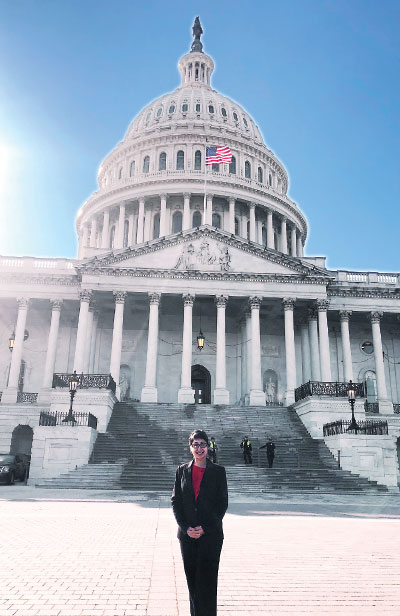APA Member Testifies on Improving SUD Treatment Access
Abstract
Smita Das, M.D., Ph.D., M.P.H., urged lawmakers to consider the impact of all substances, including opioids, methamphetamines, alcohol, and tobacco, when crafting legislation.

“The crisis America is facing when it comes to substance use disorders is not going away,” says Smita Das, M.D., Ph.D., M.P.H. “While there has been some progress and attention placed on the opioid crisis, it is important that lawmakers recognize that the fight for our patients is not over.
Early during her testimony before a Congressional committee on March 3, Smita Das, M.D., Ph.D., M.P.H., stated a simple fact: “Addiction is a chronic brain disease; it is a chronic medical illness that can be treated effectively.”
But to close treatment gaps for people with substance use disorders (SUDs), key investments in several areas are necessary, she continued, such as workforce capacity and alleviating barriers to care.
Das is a clinical assistant professor of psychiatry and behavioral health sciences at Stanford University School of Medicine, member of APA’s Council on Addiction Psychiatry, and president of the Northern California Psychiatric Society. She testified before the House Committee on Energy and Commerce’s Subcommittee on Health at a hearing titled “Combatting an Epidemic: Legislation to Help Patients With Substance Use Disorders.”
“As a district branch president and an early career psychiatrist, I am well aware of the frustrations that my colleagues and patients have with mental health policy,” Das told Psychiatric News in an email. “From reimbursement issues to access, there’s a lot that we can contribute to the discussion about mental health policy.”
The hearing was held to examine 14 bills related to the opioid crisis and the treatment of people with SUDs, including the Opioid Workforce Act of 2019 (HR 3414), which creates additional residency positions in addiction medicine, addiction psychiatry, and pain medicine, as well as the Medicaid Reentry Act (HR 1329), which would allow incarcerated individuals who are within 30 days of release to enroll in Medicaid, provided they meet eligibility criteria. APA has endorsed both bills through coalition letters.
“Using evidence-based, common-sense policies, like allowing incarcerated individuals to enroll in Medicaid prior to discharge, defragments care and coordinates support to allow patients to successfully re-enter their communities,” Das told the subcommittee. Das was part of a panel of experts who appeared before the subcommittee, including Michael P. Botticelli, executive director of the Grayken Center for Addiction at Boston Medical Center and former director of the White House Office of National Drug Control Policy under President Barack Obama; Patty McCarthy, chief executive officer of Faces & Voices of Recovery; Robert I. L. Morrison, executive director and director of legislative affairs at the National Association of State Alcohol and Drug Abuse Directors; Margaret B. Rizzo, executive director of JSAS HealthCare Inc.; and Shawn A. Ryan, M.D., M.B.A., chair of the American Society of Addiction Medicine’s Legislative Action Committee.
Das told lawmakers that psychiatrists are uniquely positioned to treat patients with SUDs and comorbid psychiatric disorders. “However, the shortage of psychiatrists and physicians trained in addiction medicine, addiction psychiatry, or pain management has created a long-standing acute treatment gap for those with or at high risk for substance use disorders,” she said. Funding new residency positions, expanding loan repayment and forgiveness, and offering incentives to work in underserved areas could help mitigate the impact of the physician shortage.
SUDs and other psychiatric illnesses are not choices or moral issues, Das testified. There are evidence-based approaches to treat people with these disorders, yet access is severely limited. In response to a question from U.S. Rep. Anna G. Eshoo (D-Calif.), chair of the subcommittee, Das explained that before California’s Medi-Cal program covered buprenorphine, she sometimes spent more time on the phone trying to get her patients access to the medication than she actually spent with the patient. “It’s very frustrating,” she said.
Lack of enforcement of the Mental Health Parity and Addiction Equity Act of 2008 also impedes access to care, she said. “Stigma in seeking help is already an enormous obstacle for our patients, but forcing both the patients and the providers to engage in bureaucracy to get coverage makes treatment that much more inaccessible,” she said.
“We must treat substance use disorders as the chronic diseases they are and pursue solutions that address all substances, including opioids, methamphetamines, alcohol, and tobacco,” she told the subcommittee. “I encourage the committee to look beyond opioids and ensure it is considering all substance use disorders as it considers legislation.” ■
A copy of Das’s testimony is posted here.



